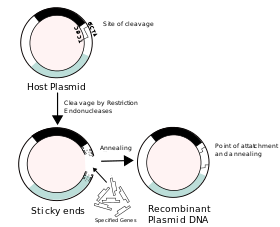
Back حمض نووي معاد التركيب Arabic Rekombinantna DNK BS ADN recombinant Catalan Rekombinante DNA German Ανασυνδυασμένο DNA Greek Rekombino de DNA Esperanto ADN recombinante Spanish DNA birkonbinatzaile Basque دیانای نوترکیب Persian Yhdistelmä-DNA Finnish

| Part of a series on |
| Genetic engineering |
|---|
 |
| Genetically modified organisms |
| History and regulation |
| Process |
| Applications |
| Controversies |
Recombinant DNA (rDNA) molecules are DNA molecules formed by laboratory methods of genetic recombination (such as molecular cloning) that bring together genetic material from multiple sources, creating sequences that would not otherwise be found in the genome.
Recombinant DNA is the general name for a piece of DNA that has been created by combining two or more fragments from different sources. Recombinant DNA is possible because DNA molecules from all organisms share the same chemical structure, differing only in the nucleotide sequence. Recombinant DNA molecules are sometimes called chimeric DNA because they can be made of material from two different species like the mythical chimera. rDNA technology uses palindromic sequences and leads to the production of sticky and blunt ends.
The DNA sequences used in the construction of recombinant DNA molecules can originate from any species. For example, plant DNA can be joined to bacterial DNA, or human DNA can be joined with fungal DNA. In addition, DNA sequences that do not occur anywhere in nature can be created by the chemical synthesis of DNA and incorporated into recombinant DNA molecules. Using recombinant DNA technology and synthetic DNA, any DNA sequence can be created and introduced into living organisms.
Proteins that can result from the expression of recombinant DNA within living cells are termed recombinant proteins. When recombinant DNA encoding a protein is introduced into a host organism, the recombinant protein is not necessarily produced.[1] Expression of foreign proteins requires the use of specialized expression vectors and often necessitates significant restructuring by foreign coding sequences.[2]
Recombinant DNA differs from genetic recombination in that the former results from artificial methods while the latter is a normal biological process that results in the remixing of existing DNA sequences in essentially all organisms.
- ^ Rosano, Germán L.; Ceccarelli, Eduardo A. (17 April 2014). "Recombinant protein expression in Escherichia coli: advances and challenges". Frontiers in Microbiology. 5: 172. doi:10.3389/fmicb.2014.00172. PMC 4029002. PMID 24860555.
- ^ "Promoters used to regulate gene expression". www.cambia.org. Archived from the original on 24 September 2018. Retrieved 16 February 2018.